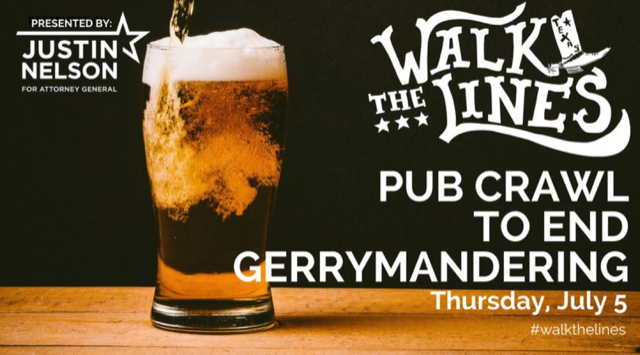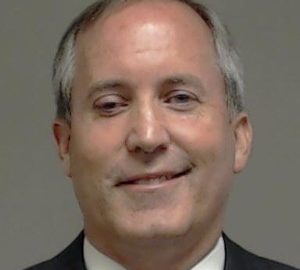Justin Nelson hit three bars on a short pub crawl Thursday night. It wasn’t a big task. The attorney, University of Texas law school professor and Democratic candidate for Texas attorney general traversed less than half a mile visiting Shangri-la, Ah Sing Den and the Easy Tiger on East Sixth Street in Austin to make a point: Somehow, thanks to Texas’ creatively drawn congressional districts, the three bars, all within a stone’s throw of one another, are in three congressional districts — Texas CD 35, Texas CD 25 and Texas CD 21, respectively.
“It’s personal to me. I teach gerrymandering and how it affects legislation in the context of my legislation class at the University of Texas,” Nelson says. “I’ve litigated gerrymandering. I filed a brief in this Wisconsin v. Gill case talking about how gerrymandering undermines our democracy and it undermines the premise of our Declaration of Independence.”
p>After the U.S. Supreme Court’s June 25 decision to uphold all but one of Texas’ congressional and legislative districts challenged in a gerrymandering case, Nelson says pointing out the absurdity of the state’s districts is important. According to critics, Texas Republicans unconstitutionally packed minority and Democratic voters together when drawing the state’s latest legislative maps in order to dilute their electoral impact. The Supreme Court disagreed.
“It just goes to show that these districts are really screwed up,” Nelson says. “Ultimately, it’s up to us, the people of Texas, to fix it. We’ve got to elect people and leaders who are not going to discriminate. I see this as a nonpartisan issue. Arnold Schwarzenegger and John McCain are two of the biggest proponents of making districts fair. I think it’s wrong when Democrats do it, and I think it’s wrong when Republicans do it.”
While Nelson says that he would work with whoever is elected with him in November to create the fairest system possible under Texas law, he says that the ideal system would be one in which voters elect multiple representatives from their districts based on ranked-choice ballots.
“It’s virtually impossible to game. You solve all issues with regard to the Voting Rights Act because the districts are between three and five representatives large, so you have communities of interest that can decide who to vote for, but also things go into to a mix, so you don’t have to worry about crazy districts or gerrymandering,” Nelson says.
While such a drastic change isn’t legally viable and likely won’t be for a long time, Nelson believes enough Republicans in Texas want to see an end to gerrymandering to allow him to get something done on the issue.
“I think there is a vast groundswell of support for this, across party lines,” Nelson says. “If you go to a system where districts are fair, and you’re not considering partisan interests and you’re allowing districts to reflect natural boundaries and have competitive balance, you’d have a different type of Texas because you’d have a Texas that works for everybody, regardless of party.”
Article by Stephen Young • View on Dallas Observer



